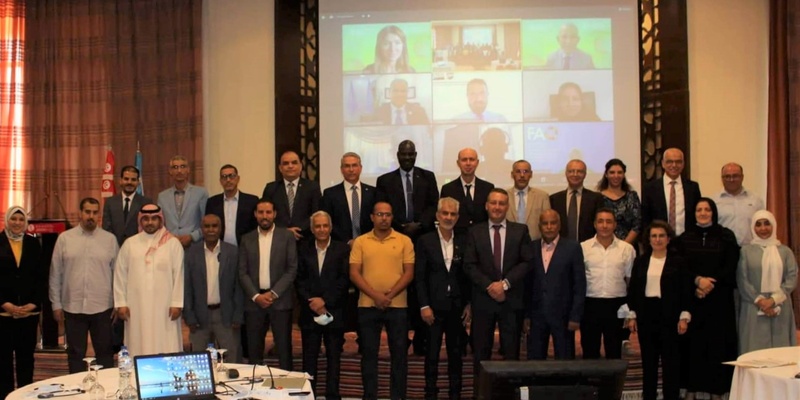Press release: IPPC, FAO hold an annual regional workshop with Near East and North Africa member countries
Posted on Wed, 03 Aug 2022, 07:48

Tunis, August 1-4, 2022. The annual regional workshop among member countries of the Near East and North Africa (NENA) region is being held this week in Tunis, Tunisia, to improve and modernize plant protection programs while encouraging regional and international cooperation.
The hybrid workshop was organized by the Food and Agriculture Organization (FAO) Regional Office and sub-regional office for the Near East and North Africa, in collaboration with the Secretariat of the International Plant Protection Convention (IPPC) and the Near East Plant Protection Organization (NEPPO), and the Ministry of Agriculture, Water Resources and Fisheries.
Several experts, including official representatives from Algeria, Saudi Arabia, Libya, Lebanon, Morocco, Mauritania, Syria, Egypt, Iraq, Jordan, Iran, Yemen, Qatar, Sudan, Kuwait, and Tunisia, resumed face-to-face meetings this year after two years of virtual exchanges due to constraints imposed by the COVID-19 pandemic.
For four days, this exceptional forum is paving the way for participants to exchange updated information on the prospects for coordination and collaboration among countries of the NENA region. The IPPC reported on the results of technical consultations on International Standards for Phytosanitary Measures (ISPMs), as well as updates on the activities of the IPPC Standards Committee and the Implementation and Capacity Development Committee (IC). Workshop participants are reviewing the comments from NENA member countries on the draft standards and other documents of the Convention.
The workshop is also focusing on current projects, as well as a study on international measures and standards relating to the protection of plants and biodiversity in countries, and how to facilitate safe trade.
In his opening address, Elyes Hamza, Minister of Agriculture, Water Resources and Fisheries, recalled the harmful consequences of diseases and the circulation of pests, parasites, viruses, insects, and fungi on plants in the NENA region. FAO estimates that up to 40 per cent of global crop production is lost annually to pests. A perfect illustration is Tunisia’s unprecedented pest contamination which decimated 8 000 hectares of cultivable areas down to 3 100 hectares, or a 61 per cent loss. This was brought on by the fire blight disease during the adoption of arboriculture, or the cultivation of trees and shrubs. Abdelhakim El Waer, FAO Assistant General Director and Regional Coordinator of the FAO for the Near East and North Africa, recalled that "the application and respect of international phytosanitary standards help countries in the region improve access of their agricultural exports to world markets and entry to the most competitive markets in Europe, Asia and America.
“In addition to threats to human health, the continued prevalence of plant pests and diseases poses a serious threat to food security. The damage to agriculture exacerbates the growing problem of world hunger and threatens the means of rural subsistence,” he says.
IPPC Secretary Osama El-Lissy emphasized the essential role that innovative plant health methods have in guaranteeing the right to food for everyone. He reminded participants that preventative international phytosanitary standards are key to avoiding costly eradication and control responses to emergency pest outbreaks in all regions of the globe.
“The IPPC has an important role in protecting plants and in combatting hunger on a global scale. The IPPC Secretariat remains committed to working together with FAO and national and regional plant protection organizations in fulfilling our collective mission. That is, to safeguard agricultural and natural resources against invasive pests and diseases. We also work to facilitate the safe trade not only of plants, plant products, and regulated articles but also of agricultural crops that will help feed an increasingly hungry global population,” El-Lissy says.
Plant health experts at the workshop are also addressing the region's most urgent plant pest concerns that threaten agricultural development and food security. Among these include red weevil which threatens palm trees, fall armyworm which attacks cereals like maize, the fourth tropical strain of Fusarium which causes banana wilt disease, and the bacterium Xylella fastidiosa which destroys olive trees.

